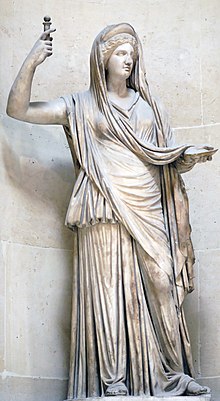
Back Hera Afrikaans Hera ALS Hera AN هيرا Arabic هيرا ARZ হীৰা (গ্ৰীক দেৱী) Assamese Hera AST Hera Azerbaijani Гера Bashkir Hera BAR
| Hera | |
|---|---|
| |
| Member of the Twelve Olympians | |
 | |
| Major cult center | Argos, Mycenae, Samos |
| Abode | Mount Olympus |
| Animals | Cow, cuckoo, peacock |
| Symbol | Pomegranate, sceptre, crown (polos or diadem) |
| Genealogy | |
| Parents | Cronus and Rhea |
| Siblings | Poseidon, Hades, Demeter, Hestia, Zeus |
| Consort | Zeus |
| Children | Angelos, Arge, Ares, the Charites, Eileithyia, Eleutheria, Eris, Hebe, Hephaestus |
| Equivalents | |
| Roman | Juno |
| Part of a series on |
| Ancient Greek religion |
|---|
 |

In ancient Greek religion, Hera (/ˈhɛrə, ˈhɪərə/; ‹See Tfd›Greek: Ἥρα, translit. Hḗrā; Ἥρη, Hḗrē in Ionic and Homeric Greek) is the goddess of marriage, women, and family, and the protector of women during childbirth. In Greek mythology, she is queen of the twelve Olympians and Mount Olympus, sister and wife of Zeus, and daughter of the Titans Cronus and Rhea. One of her defining characteristics in myth is her jealous and vengeful nature in dealing with any who offended her, especially Zeus's numerous adulterous lovers and illegitimate offspring.
Her iconography usually presents her as a dignified, matronly figure, upright or enthroned, crowned with a polos or diadem, sometimes veiled as a married woman.[1] She is the patron goddess of lawful marriage. She presides over weddings, blesses and legalises marital unions, and protects women from harm during childbirth. Her sacred animals include the cow, cuckoo, and peacock. She is sometimes shown holding a pomegranate as an emblem of immortality. Her Roman counterpart is Juno.[2]
- ^ Elderkin(1937), "The marriage of Zeus with Hera"
- ^ Larousse Desk Reference Encyclopedia, The Book People, Haydock, 1995, p. 215.